We recently received a request from the Edithburgh History Group for our assistance re protecting the marine life to be found at Edithburgh jetty. There was a particular focus on a recent case of sea cucumber harvesting. Although we haven’t yet heard back from the group, the harvesting of sea cucumbers from Edithburgh jetty is of concern.
This topic was an item on the agenda for our May General Meeting. Our members seemed to have different ideas regarding the benefits of sea cucumbers and what effect their harvesting may have on the environment.
This matter came back into my mind when I watched “Great Barrier Reef: A Living Treasure”, Season 1, Episode 4 – “Coral Sea” on television recently. It is a four-part documentary series about the Great Barrier Reef. Narrated by Russell Crowe, it says that the Great Barrier Reef is “a unique eco-system in danger of being lost forever”.
Whilst discussing sea cucumbers on the Great Barrier Reef, Russell Crowe said, “Like a vacuum cleaner, they vacuum and purify the sand”. My ears pricked up on hearing this. It can be seen and heard at the 18.27minute mark at https://www.9now.com.au/great-barrier-reef-a-living-treasure/season-1/episode-4 .
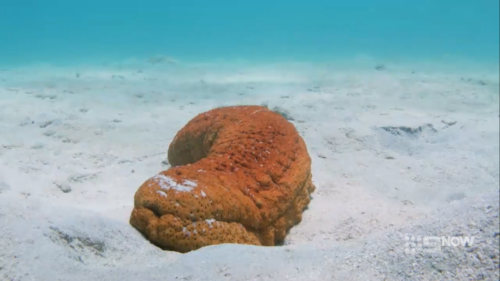
(Source: https://www.9now.com.au/great-barrier-reef-a-living-treasure/season-1/episode-4 )
This prompted me to research the topic in more detail.
Firstly, sea stars, sea urchins and sea cucumbers are all Echinoderms (Phylum Echinodermata).
Sea urchins and sea cucumbers belong to the Subphylum Echinozoa.
Sea cucumbers belong to the Class Holothuroidea.
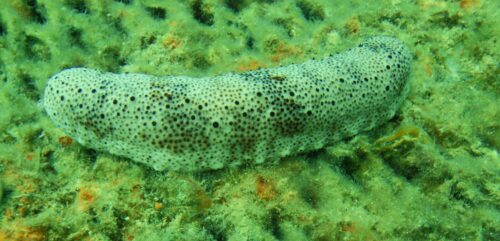
Sea cucumbers are also referred to as trepang and beche-de-mer, and they are harvested for both food and medicine in some countries.
According to Facts About Sea Cucumbers (thoughtco.com), “Some sea cucumbers collect food from the surrounding water, while others find food on or in the ocean bottom. Some sea cucumbers bury themselves fully in the sediment.
“Some species ingest sediment, remove the food particles and then excrete the sediment in long strands. One sea cucumber can filter up to 99 pounds of sediment in a year. The excretions of sea cucumbers help keep nutrients cycling throughout the ocean ecosystem.”

(Source: https://www.9now.com.au/great-barrier-reef-a-living-treasure/season-1/episode-4 )
According to The Echinoblog: The Importance of Sea Cucumber Poop! by Mah, C. 2013, “Poop is ….. biologically important …. (and) Recent research has brought a powerful spotlight on not just the ecological, but the overall, importance of sea cucumbers to the environment”.
Further, “the key dynamic present to their importance is that they cycle or process what they eat and what they defecate contributes to the health of the habitat they inhabit.”
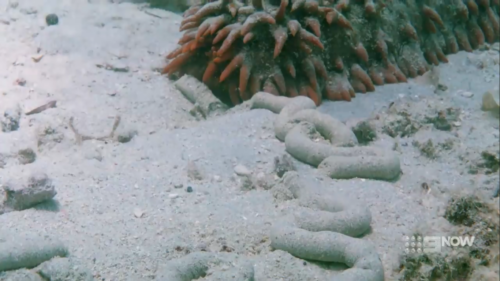
(Source: https://www.9now.com.au/great-barrier-reef-a-living-treasure/season-1/episode-4 )
The next heading reads, “Sea Cucumber poop buffers against ocean acidification on coral reefs”. This is followed by, “ an interview with Maria Byrne about how sea cucumber “poop” is important to geochemical processes on a coral reef.”
Further, “Coral has to develop or accumulate calcium carbonate, which is the mineral used to compose coral skeletons, at an equal or better than the rate at which the coral loses calcium carbonate via erosion, natural dissolution, etc. A survey of the sea cucumbers Stichopus herrmanni and Holothuria lecuospilota in One Tree Reef, Australia showed that the sea cucumbers could digest and dissolve so much of the adjoining sediment and rubble (i.e. the sand) that they actually contributed up to 50% or MORE of the total amount calcium carbonate dissolved over a night time. Presumably this was made available for coral to use for reef development.
“So, sea cucumbers contribute calcium carbonate to the coral reef’s “chemical budget”. They act like a natural antacid to neutralize other acidic environmental sources. Under normal conditions, there’s an equilibrium. The abundance or number of sea cucumbers can affect this. Thus, in theory, MORE sea cucumbers might produce so MUCH alkalinity (or “basic” poop to the water) that conceivably they could function as a control or at least a buffer against increases in more acidic sea water. This obviously is important when you consider ocean acidification resulting from global warming. Sea cucumber poop is an important part of helping to keep the geochemical balance of a coral reef in equilibrium.”
Certainly, everything mentioned so far has been about coral reefs, but what about our temperate waters?
The next heading reads, “Sea Cucumbers EAT tasty bottom poop and clean it up!” – “Poop is processed into useful nutrients! Overabundance of nutrients (i.e. eutrophication) is broken up by sea cucumber feeding!
“A recent paper in PLOS one from Thomas MacTavish and colleagues in New Zealand studied a local sea cucumber Australostichopus mollis and how its presence affects the nutrient cycling in its surroundings. MacTavish and his colleagues studied a nutrient-rich environment covered by algae, mussel faeces and other nutrient-rich goodies. Under normal circumstances, these would build up bacteria, ammonia and other factors creating conditions that contribute to the growth of algae, which ultimately chokes everything else out (a.k.a. eutrophication).
“But you put a sea cucumber into these settings? They LOVE it! They eat and all sorts of good things happen:
- Bacterial abundance increases
- Organic material (i.e. the goo) begins to decompose more quickly
- Organic materials are redistributed from the marine sediments into the water
“Sea cucumbers help to break down organic material and redistribute the nutrients! The poop is an important part of that process.”
The article then goes on about aquaculture and eutrophication. A later heading reads, “Sea Cucumber poop is good for plants (mangroves, seagrass, etc.), which are part of a healthy eco-system. (Not just) the poop-but the animal digesting and then processing the sediment. ….. they break down organic detritus and make the nutrients available to the water column preventing hypoxia and other bad things going down in the sediment…
“The nutrient cycling role of sea cucumbers has been observed as an important part of ecology. One post I put up awhile back shows that the presence of sea cucumbers leads to more productive sea grass! and thus a more diverse and healthy tropical ecosystem. Think of them as earthworms! go through the bottom sediments, eat all the organics and leave the sediment.. that’s sea cucumber poop!”
The next heading reads, “Deep-Sea (Cucumbers) have pretty diverse microbial faunas that live in their guts! (and thus their poop!) Deep-sea sea cucumbers perform very much the same kind of function as the shallow water ones. They live in much finer mud and are often rained upon by nutrients from the surface. Many of these critters, such as Molpadia live buried in the mud.”

Our website features a list of sea cucumbers to be found in South Australian (and adjacent Commonwealth) waters.
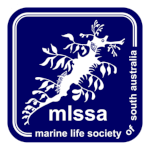
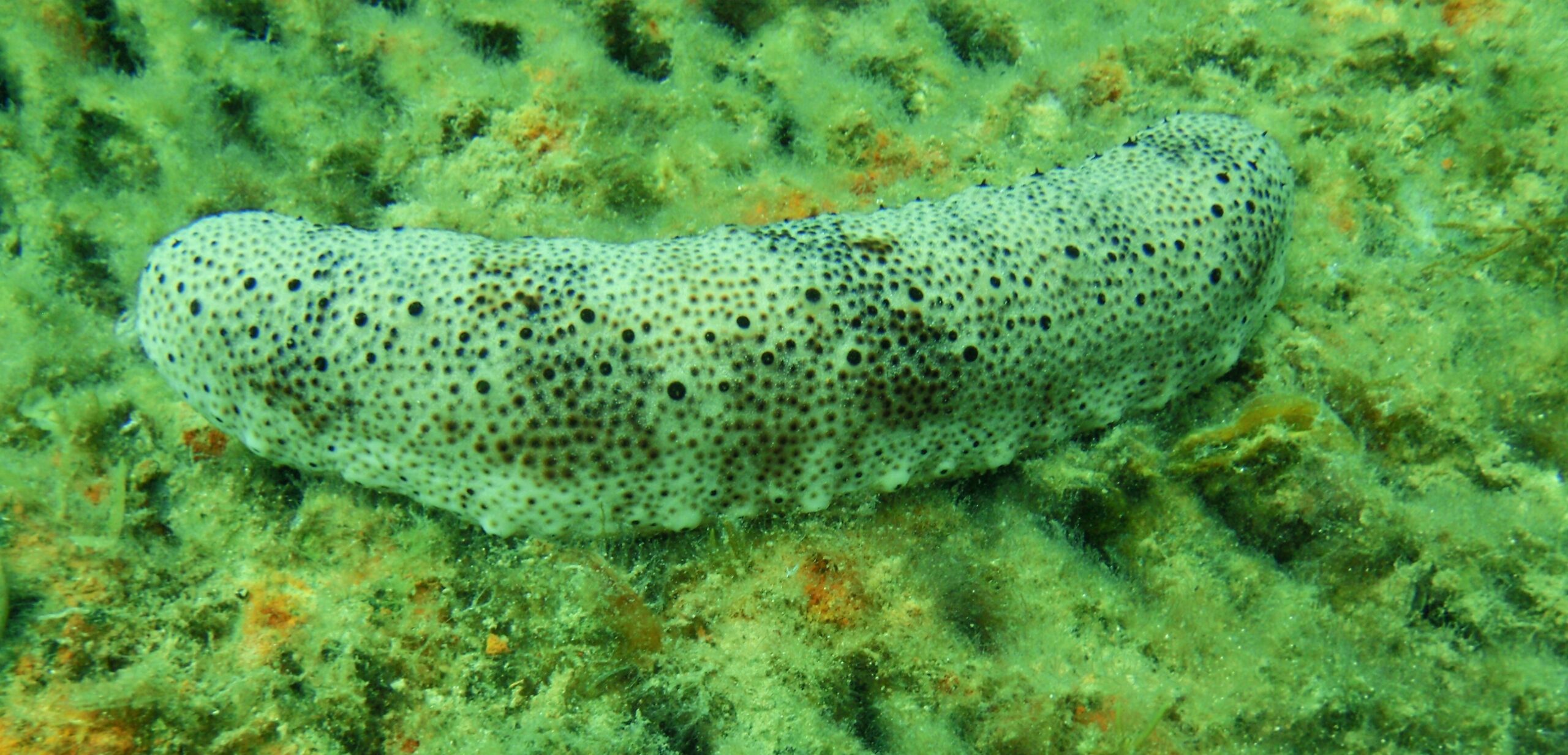
Complex stuff, and while I accept that holothurians must inherently be good for the environments they inhabit, where things are in a reasonably healthy balance year to year, I am confused about the chemistry of their poop vs a coral reef’s health. Is the poop actually alkaline? I think the distinction between #1 the calcium carbonate they mobilise into the water column by ‘digestion’ (something to do with the digestive process, anyway,and that process always involves bacteria!) of dead coral particles (part of the sand ,where sand is loosely defined), being a welcome indeed essential nutrient for coral growth and #2 the question of if and how the sea cucumbers actually raise the alkalinity of the water around them. Sure, coral is intolerant of relatively mild acidity, so any alkaline products of this digestion that are freely soluble in sea water should assist coral growth and the survival of coral reefs may be enhanced. But I remain confused about how the alkalinity arises from the presence of sea cucumbers and how it dissolves, which would seem essential for the coral to benefit.
All good food for thought, anyway!